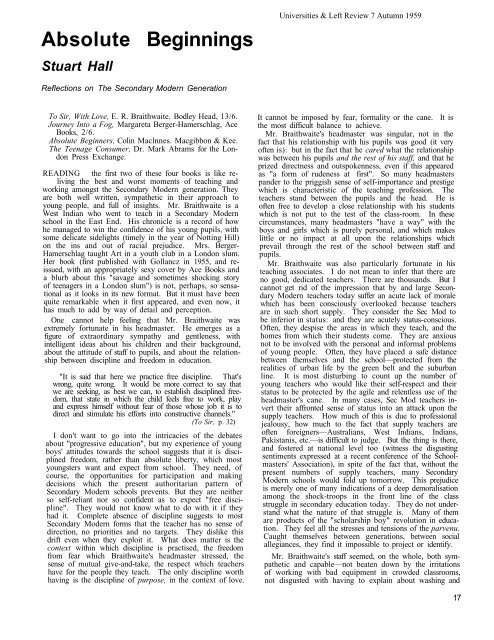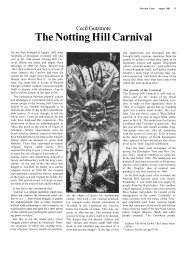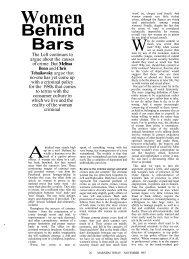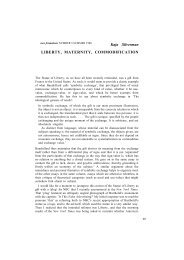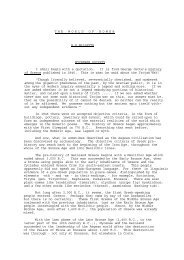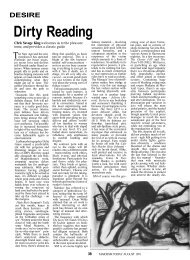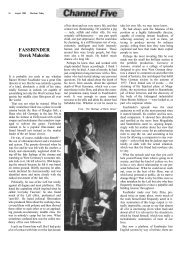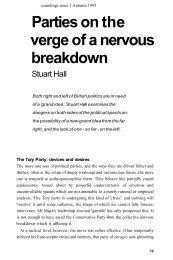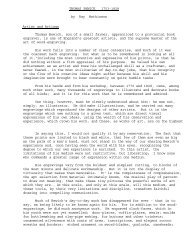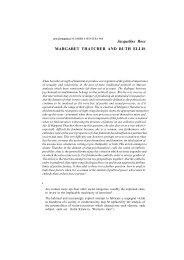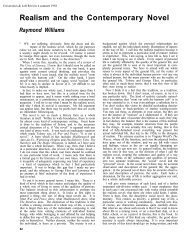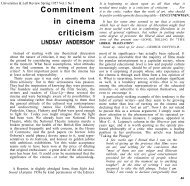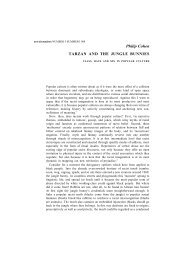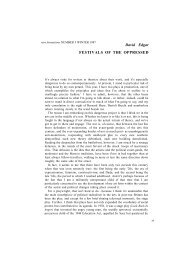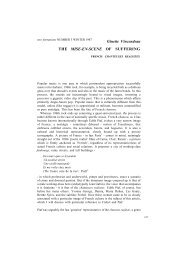Absolute Beginnings Stuart Hall
Absolute Beginnings Stuart Hall
Absolute Beginnings Stuart Hall
Create successful ePaper yourself
Turn your PDF publications into a flip-book with our unique Google optimized e-Paper software.
<strong>Absolute</strong> <strong>Beginnings</strong><br />
<strong>Stuart</strong> <strong>Hall</strong><br />
Reflections on The Secondary Modern Generation<br />
To Sir, With Love, E. R. Braithwaite. Bodley Head, 13/6.<br />
Journey Into a Fog, Margareta Berger-Hamerschlag, Ace<br />
Books, 2/6.<br />
<strong>Absolute</strong> Beginners, Colin Maclnnes. Macgibbon & Kee.<br />
The Teenage Consumer, Dr. Mark Abrams for the London<br />
Press Exchange.<br />
READING the first two of these four books is like reliving<br />
the best and worst moments of teaching and<br />
working amongst the Secondary Modern generation. They<br />
are both well written, sympathetic in their approach to<br />
young people, and full of insights. Mr. Braithwaite is a<br />
West Indian who went to teach in a Secondary Modern<br />
school in the East End. His chronicle is a record of how<br />
he managed to win the confidence of his young pupils, with<br />
some delicate sidelights (timely in the year of Notting Hill)<br />
on the ins and out of racial prejudice. Mrs. Berger-<br />
Hamerschlag taught Art in a youth club in a London slum.<br />
Her book (first published with Gollancz in 1955, and reissued,<br />
with an appropriately sexy cover by Ace Books and<br />
a blurb about this "savage and sometimes shocking story<br />
of teenagers in a London slum") is not, perhaps, so sensational<br />
as it looks in its new format. But it must have been<br />
quite remarkable when it first appeared, and even now, it<br />
has much to add by way of detail and perception.<br />
One cannot help feeling that Mr. Braithwaite was<br />
extremely fortunate in his headmaster. He emerges as a<br />
figure of extraordinary sympathy and gentleness, with<br />
intelligent ideas about his children and their background,<br />
about the attitude of staff to pupils, and about the relationship<br />
between discipline and freedom in education.<br />
"It is said that here we practice free discipline. That's<br />
wrong, quite wrong. It would be more correct to say that<br />
we are seeking, as best we can, to establish disciplined freedom,<br />
that state in which the child feels free to work, play<br />
and express himself without fear of those whose job it is to<br />
direct and stimulate his efforts into constructive channels."<br />
(To Sir, p. 32)<br />
I don't want to go into the intricacies of the debates<br />
about "progressive education", but my experience of young<br />
boys' attitudes towards the school suggests that it is disciplined<br />
freedom, rather than absolute liberty, which most<br />
youngsters want and expect from school. They need, of<br />
course, the opportunities for participation and making<br />
decisions which the present authoritarian pattern of<br />
Secondary Modern schools prevents. But they are neither<br />
so self-reliant nor so confident as to expect "free discipline".<br />
They would not know what to do with it if they<br />
had it. Complete absence of discipline suggests to most<br />
Secondary Modern forms that the teacher has no sense of<br />
direction, no priorities and no targets. They dislike this<br />
drift even when they exploit it. What does matter is the<br />
context within which discipline is practised, the freedom<br />
from fear which Braithwaite's headmaster stressed, the<br />
sense of mutual give-and-take, the respect which teachers<br />
have for the people they teach. The only discipline worth<br />
having is the discipline of purpose, in the context of love.<br />
Universities & Left Review 7 Autumn 1959<br />
It cannot be imposed by fear, formality or the cane. It is<br />
the most difficult balance to achieve.<br />
Mr. Braithwaite's headmaster was singular, not in the<br />
fact that his relationship with his pupils was good (it very<br />
often is): but in the fact that he cared what the relationship<br />
was between his pupils and the rest of his staff, and that he<br />
prized directness and outspokenness, even if this appeared<br />
as "a form of rudeness at first". So many headmasters<br />
pander to the priggish sense of self-importance and prestige<br />
which is characteristic of the teaching profession. The<br />
teachers stand between the pupils and the head. He is<br />
often free to develop a close relationship with his students<br />
which is not put to the test of the class-room. In these<br />
circumstances, many headmasters "have a way" with the<br />
boys and girls which is purely personal, and which makes<br />
little or no impact at all upon the relationships which<br />
prevail through the rest of the school between staff and<br />
pupils.<br />
Mr. Braithwaite was also particularly fortunate in his<br />
teaching associates. I do not mean to infer that there are<br />
no good, dedicated teachers. There are thousands. But I<br />
cannot get rid of the impression that by and large Secondary<br />
Modern teachers today suffer an acute lack of morale<br />
which has been consciously overlooked because teachers<br />
are in such short supply. They consider the Sec Mod to<br />
be inferior in status: and they are acutely status-conscious.<br />
Often, they despise the areas in which they teach, and the<br />
homes from which their students come. They are anxious<br />
not to be involved with the personal and informal problems<br />
of young people. Often, they have placed a safe distance<br />
between themselves and the school—protected from the<br />
realities of urban life by the green belt and the suburban<br />
line. It is most disturbing to count up the number of<br />
young teachers who would like their self-respect and their<br />
status to be protected by the agile and relentless use of the<br />
headmaster's cane. In many cases, Sec Mod teachers invert<br />
their affronted sense of status into an attack upon the<br />
supply teachers. How much of this is due to professional<br />
jealousy, how much to the fact that supply teachers are<br />
often foreigners—Australians, West Indians, Indians,<br />
Pakistanis, etc.—is difficult to judge. But the thing is there,<br />
and fostered at national level too (witness the disgusting<br />
sentiments expressed at a recent conference of the Schoolmasters'<br />
Association), in spite of the fact that, without the<br />
present numbers of supply teachers, many Secondary<br />
Modern schools would fold up tomorrow. This prejudice<br />
is merely one of many indications of a deep demoralisation<br />
among the shock-troops in the front line of the class<br />
struggle in secondary education today. They do not understand<br />
what the nature of that struggle is. Many of them<br />
are products of the "scholarship boy" revolution in education.<br />
They feel all the stresses and tensions of the parvenu.<br />
Caught themselves between generations, between social<br />
allegiances, they find it impossible to project or identify.<br />
Mr. Braithwaite's staff seemed, on the whole, both sympathetic<br />
and capable—not beaten down by the irritations<br />
of working with bad equipment in crowded classrooms,<br />
not disgusted with having to explain about washing and<br />
17


